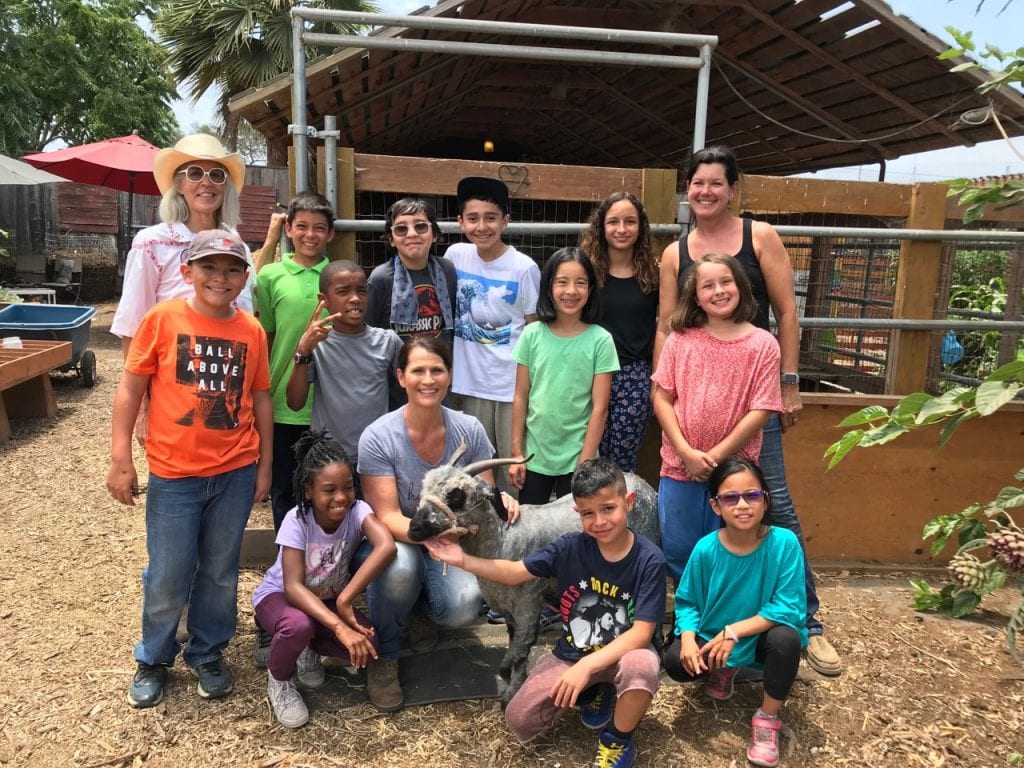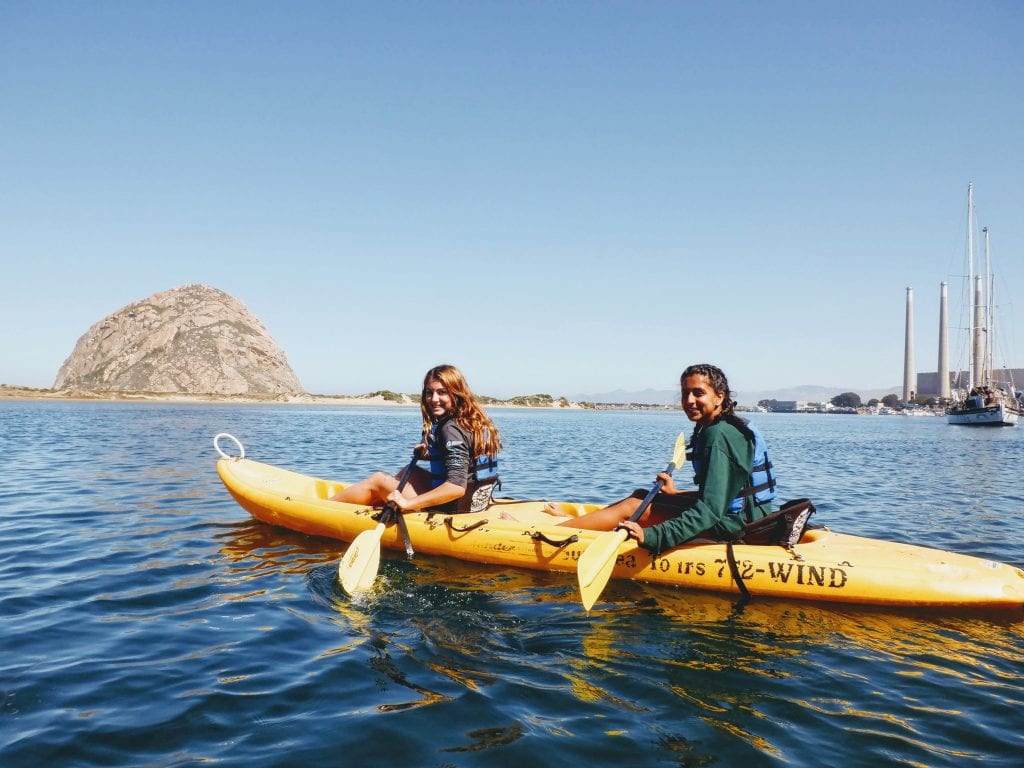
It used to be that summer camp meant a few things – singing around a campfire, bunking in cabins and exploring the outdoors in hiking boots, canoes and swimsuits. Today, the quintessential summertime experience can also include learning to code a ninja robot, practicing a new language or forming a rock band. While these are fantastic new options, screens increasingly dominate over unstructured outdoor play, making time spent in the great outdoors more important than ever. We spoke to some local camp directors to give you ideas about where to go, what to expect and the many benefits of this old-fashioned summer experience.
Luckily for us Angelenos, Southern California offers an abundance of outdoor day camps and sleep-away options. Day camps take campers as young as 4 and 5, while overnight campers can start around age 7, up to 17 years. Those ages 14 and older can participate at many camps as campers in leadership training, a fun and educational experience in its own right. “There is a camp out there for everybody, and it’s my opinion that every kid deserves the experience,” says Mike Stillson, executive director of Valley Trails Summer Camp.
That experience might mean hanging out in the wild spaces of suburbia, such as Tom Sawyer Camp in Altadena or Tumbleweed Day Camp in Brentwood, both of which offer day camps. Several urban farms – such as Moonwater Farm, located in a residential area of Compton – offer experiences learning about farm animals and agriculture. For those ready for an overnight experience, there is River Way Ranch in Sanger, Camp Ocean Pines in Cambria or Valley Trails in Tarzana and Santa Clarita, among many others. Thanks to the Los Angeles Maritime Institute, kids can even enjoy a five-day adventure aboard a tall ship out at sea.
Camp activities vary as much as the types of camps offered. Traditional overnight camps provide the widest range of daily activities, which might include everything from water sports and horseback riding to theater arts and cooking. Whether at a lake, the beach or a pool, most camps have some daily time in the water as well. Outdoor-based day camps have a similar lineup of activities that may skew slightly younger – think more tug of war than high-ropes course. According to several camp directors, archery tag (using arrows with rounded foam tips) is likely to be one of the most popular activities at camps this summer.
If you choose an adventure out to sea, expect campers to learn to raise the sails, steer the ship and help to cook their own meals. “For many kids, our summer camp is the first time they’ve had chores,” says Alice Taylor of the Los Angeles Maritime Institute. But it’s not all hard work. Campers also learn about marine biology, stargaze at night and even jump off the boat for a quick dip. Once the ship reaches Catalina Island, there is hiking, kayaking, beach barbecues and hanging on the beach. “We’re doing camp, but on the move,” Taylor says.

Farm camps foster land stewardship and conservation through activities such as planting and harvesting, feeding animals and learning about vermiculture and composting. At Moonwater Farm, campers also participate in arts and movement activities and help to create their own plant-focused meals. If it sounds like these camps are only for outdoorsy, active, outgoing kids, think again. Campers from all backgrounds and personalities are welcomed – and encouraged. Kathleen Blakistone, co-creator of Moonwater Farm, explains that she started her camp for those who may not otherwise have the chance to experience nature. For Noah Kalb, director of education at the Los Angeles Maritime Institute, being uninitiated shouldn’t exclude participation. “We’ve had kids who have never been on a boat or done any sailing, let alone seen the ocean before,” he says. “That’s perfectly fine, that’s what we do, teach them the ropes.”
Soft skills
On the surface, the beauty of outdoor camp lies in the fun-filled days of horseback riding, archery and kayaking, hilarious antics with camp counselors and a new crop of friends. But it’s also about the freedom to experience life outside the routines and pressures of the school year in an outdoor setting. “School is a place for grades and testing,” says Erin Moses, summer camp director at Camp Ocean Pines. “Camp is a place that kids aren’t judged. They can be themselves. That’s really important.”
Summer camp is also an opportunity to develop a different – and equally important – set of skills from those championed at school, including patience, resilience and cooperation. “The hundreds of activities we do all summer long isn’t the point,” says Liz Kimmelman, co-owner of Tumbleweed Day Camp. “It’s the experience of trying new things, dabbling in different areas of interest and navigating social spheres – all in a hands-on environment. These experiences build confidence, foster the ability to make decisions and facilitate exploration with the world around them. So many new skills are developed at camp, beyond the obvious.” Given the development of these important “soft skills” at camp, and the taste of independence, many camp directors see outdoor-focused sleep-away camps as an ideal way to set the groundwork for a successful college experience. Day camps offer many of the same benefits for campers not yet ready to sleep away.
Tech-free time
While there may be exceptions, outdoor summer camps tend to be screen free, meaning that phones, iPads and computers are not used at any time. It isn’t surprising that parents love this notion, but camp directors say that campers unequivocally love it, too. The pressure to always be connected is relieved – a reprieve for kids – and the quest for “likes” gives way to authentic experiences.
“In this day and age, it’s so nice to get out of the day-to-day routine of video games and get put into a structured routine where the rocky, uneven dirt at camp provides a direct metaphor for growth in their life,” says Ashley Crother-Oken, director of River Way Ranch Camp. “Campers crave this.”

Unplugged environments also allow campers to cultivate the art of friend-making. Counselors play the part of positive role models. At River Way Ranch Camp, counselors are viewed as “friendship coaches” who help campers navigate social situations, develop empathy and practice the art of conversation.
Plan for tiredness, some dirt and plenty of sunscreen and water
Being outside for the majority of the day requires more hydration and sun protection than some kids might be used to. While well-programed camps will provide reapplication and water breaks throughout the day, always apply sunscreen and offer plenty of water prior to camp.
And, expect a bigger dinner to be eaten at the end of the day to account for all the extra energy that camp demands. Kimmelman explains that in addition to using their bodies all day long – running, playing, swimming – campers have to muster the additional mental fortitude it takes to negotiate friendships and learn new skills. She stresses the need to keep overscheduled days to a minimum and to consider committing to one or two camps for the summer, instead of several over a period of weeks. The latter, she says, is akin to starting work at a new job each week and navigating new skills, co-workers and bosses. Understandably for many kids, this is simply exhausting.
Finally, expect a little extra dirt in your life on camp days. “Get comfortable with sand in your car, dirt on your handles and messy smiles on your kids’ faces,” advises Blakistone. In other words, get ready for a summer of outdoor fun.
Elisa Parhad is a Los Angeles-based writer and mom of two. After researching outdoor summer camps for this story, she wishes she could sign herself up for camp for the leisurely horseback rides, archery practice and hours at the arts and crafts table.
























